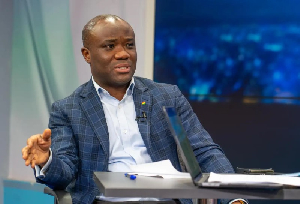PREMISE
We have all read Ayittey?s position on the use of tractors by Ghanaians farmers. His preferences are donkeys, cutlasses, hoes and other ?intermediate technology? equipment. His claim is that, even though tractors are efficient and effective, they cost rather too much and their maintenance is way too high. This he claims is not workable with peasant farming.
CASE AGAINST
First of all, anyone who has farmed in Ghana, like I have, knows that, under half of 1% of our farmers own tractors. I am saying the latter based on observation. Now, of those that own privately, they have probably the best maintained tractors anywhere on earth. We all know how private ownership leads to good care in most instances.
The rest of our farmers do not own tractors and have nothing to do with driving these machines or maintaining them. My first hand experience with a system that works extremely well is the AMASAMAN TRACTOR STATION. This was one of Nkrumah?s initiatives. Here is how it works, you go to the station, pay for the acreage that you want ploughed and then they give you a time to show up at the said plot. Sometimes they will even meet you at your house. At the said time, they come and plough your field. A week or two later, they come in harrow your field as well. Now the field is ready for planting. As explained here, the farmer has nothing to do with driving, owning or maintaining the tractor. Also, the tractor is able to service as many farmers as is required.
When ploughing is done, it is time to maintain the tractors and also use them for spraying of herbicide and other farm related chores. Other services the tractors provide are hauling water to the farms and helping with the harvest once the corn and other cash crops are ready. As one can see, there is enough work to keep any tractor busy and profitable in any rural area or jurisdiction. In fact, I have witnessed times where these tractors have been so busy that people have to wait in line to the extent of missing the farming season.
Based on the above scenario, it is obvious that the issue with tractors in Ghana has nothing to do with cost. I have also seen with my naked eyes, trained Ghanaian machinist, REPAIR and maintain these machines flawlessly. It used to be that, people competed to go on courses overseas to learn how to maintain these machines. Let me also add that tractors have the durability that not even a car comes close. I remember the Merssey Ferguson brand as one of many names that seems to be indestructible. Later on, other brands were introduced that worked quite well but not as well as the British made Ferguson.
It appears to me that given the facts above, it will be wrong for Ayittey, an economist and a critic, to make such unfounded claims about the use of tractors in Ghana. It appears to me that his assertion is not based on any empirical facts. Instead, he dabbles in hearsay and over generalizations to score points. It is also clear to me that Ayittey is totally ignorant of how tractors operate in the rural areas. He is not aware of the usefulness of tractors in the rural areas. In fact, besides all the important chores that tractors are used for, they also serve as good old transportation for the rural folks. Sometimes it takes the market women all the way to the city market. Tractors are able to go to places where cars dare not go.
As an economist, has doctor Ayittey tried to find out the impact of tractors on the rural communities? I can confess based on firsthand experience that tractors are very vital to the economy of rural areas. They provide jobs and make life a hell of a lot easier. From drinking water to farm work. This Ayittey knows nothing about. The positive impact of tractors far dwarfs the wicked calluses and sore backs that cutlasses and hoes deliver.
THE REAL ISSUE
It is now clear that tractors are really needed in the rural areas. Our farmers cannot continue to operate at the cutlass level and make a decent enough living to educate their kids. It is in fact a very wicked and impractical idea to say that a man with about two wives and 6-10 kids should farm 5-10 acre of land with a cutlass, hoe and donkeys. How can these farmers shatter the vicious cycle of poverty? How will they be able to educate their kids in schools like Adisadel, Apam or Mfantipim? If real development has to happen in the rural areas, our farmers will have to be our first line of attack. This means that they have to work smarter not harder. The parents themselves need to make time for adult education and therefore, cannot spend all their precious little time breaking their sore backs in the scorching sun. This paradigm must change. Keep in mind that I have not even questioned the subsistence level of farming. This whole paradigm has to change.
Now, the real issue with tractors is not cost or maintenance know-how but corruption. The abuse of public office by these corrupt TRACTOR STATION managers really exposed me to the Ghanaian mentality as it relates to government ownership of business. Most of these TRACTOR station managers were engineers trained abroad. You would think they know better, instead, they used these tractors as if it were their personal property. The other piece to the corruption pie was the personnel at these stations. The drivers ploughed and pocketed money whilst the government kept providing for spare parts, engine oil and gas oil to keep the operation going. Girl friends benefited, as well as wives and family members. Sometimes, tractors were used in the middle of the night to do private work for personal gain. This is all firsthand observation. I am not dealing with textbooks or newspaper clippings. Talk about anecdotes! So you can clearly see how a profitable venture, produced profit for the people in charge and left the government reeling. How can we blame pioneers like Nkrumah when actually the problem lies with our character and behavior? Should we blame the man that had enough sense to encourage Ghanaians to work for themselves? Here we have a beautiful system that has been abuse to the hilt. This had nothing to do with the concepts of tractors itself. It has to do with the people who abused their office for personal gain at the expense of the country. The issue is not tractors! I mean whether nuclear or solar powered.
SOLUTION:
The solution as we have said over and over again is cooperative farming. The government in conjunction with the people can take the lead on this initiative. Farmers can be organized in cooperatives which will in turn own these tractors. These tractors can then be loaned to farmers as they sign up for hire. The idea will be to break even but if they make profits, the revenue can be ploughed back into the cooperative.
The other benefits of cooperative farming are buying seeds and other farm equipments in bulk. This will make farming much more affordable and enjoyable. Extension services can also be attained or obtained through these cooperatives. In fact, cooperatives are the surest way to reach farmers with correct up to date information on farm practices. Simple tactics like crop rotation, disease detection and post harvest management can be taught to these farmers in groups.
This will in turn reduce cost to the individual farmer, keep him or her informed, provide avenues for farmer/government feedback and begin to transform farming as we know.
The corruption issue will also be addressed in the cooperative setting. Since the ownership of these farm equipments is local, the members will seek their interest by making sure that others do not get fat at their expense. This is in stark contrast to a situation where the government sits in Accra and the criminals operate at the local level.
Also the government does not have to provide spare parts and inputs that end up being diverted before they get to the villages. There is a huge saving in cost for the government as it relates to managing this who business of farming. Besides it gives the locals an opportunity to run their own affairs and gain experience in managing organizations. It provides good training ground for would be leaders. Everyone is happy at the end of the day.
Let me end by saying that, the issue is not the use or cost of tractors. After all, Ghanaians drive BWMs and MERCEDES all over the place. They can afford tractors if they want to. They can afford used tractors just like they do used cars. Owning a well run tractor operation is very profitable in Ghana. The real problem lies with the PEOPLE THAT RUN THE SYSTEM.
This is why local private ownership is the best way to go. After all in Ghana we put the ?R? in repair. We do not replace maintenance parts but actually repair broken parts. This ought to say it all for the ability of the Ghanaian to mechanically repair and maintain simple machines like tractors. We have to change our attitudes and work together. The issue is not the cost or maintenance of tractors. It is the attitude of the Ghanaian. If and when Ghanaians change, even stupid system will all of a sudden make sense.



















